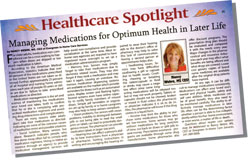By Nancy Webre, BS, MS
 For older adults, medication non-compliance can be a crisis waiting to happen when doses are skipped or too much medication is taken.
For older adults, medication non-compliance can be a crisis waiting to happen when doses are skipped or too much medication is taken.
According to the American Medical Association, statistics indicate that over 60% of the medications prescribed in the United States are not taken as directed. Further,
approximately 25% of all hospital and nursing home admissions each year of people 65 years or older are due to failure to take prescribed medications as directed.
Medication management is the art and science of monitoring the medications your loved one takes, both to confirm that he or she is complying with prescribed medication
regimens and avoiding drug interactions and complications.
There are many reasons older adults don’t take their medications as directed. Following are some of the common causes of medication errors and possible solutions:
- Social isolation. Many seniors live alone. Research indicates people who live alone more often fail to comply with medication regimens. Hiring in-home assistance through an agency to provide medication management services will help avoid non-compliance and provide socialization at the same time. Most in-home care agencies are required to have registered nurse oversight to set up a medication administration program.
- Memory loss. Seniors may simply forget to take their medications due to dementia related issues. They may also forget if they took a medication and may take it again, causing an overdose. Numerous medication dispensing systems are available on the market which provide reminders for doses such as an automated voice, display screen and flashing lights. Several systems even have online capacity to notify family members of missed doses. Simple pill reminders or organizers set up by family or in home caregivers may also help to keep seniors compliant.
- Vision problems. For seniors with vision problems, inability to distinguish between pills or not being able to read the small print on labels can lead to potentially dangerous misuse. The pharmacist can provide medication labels in larger size print.
- Hearing loss can affect a person’s ability to hear instructions from a physician or pharmacist. Getting instructions in writing and encouraging the hearing impaired to wear their hearing aids to the doctor’s office or pharmacy may help to solve this lack of communication. Having a second person at appointments helps also.
- Swallowing issues. Seniors may have difficulties swallowing a pill or capsule due to health issues. Crushing, chewing or breaking the tablet/capsule in food or drinks may cause a negative effect since some long-acting medications will be released too fast or may not work properly. Tablets or capsules should not be chewed, broken or mixed in fluid unless the pharmacist or physician indicates it is ok to do so. Also, the pharmacist will know if the drug comes in a liquid form.
- Income may limit the ability to purchase some medications for those who are low-income. Some seniors may go without medications for long stretches of time, cut back on doses or split pills to save money. Prescription assistance programs are available through some drug manufacturers. Some pharmacies also offer discount programs. The prescription drug plan should be evaluated and compared it with the needs every year. Major changes in the pharmaceutical and insurance industries each year may affect what benefits are being offered and what drugs are covered. Lower cost generic copies of brand name medicines are available after the original drug patents have expired.
At any age, it can be difficult to manage medications consistently. Medications can affect your loved one’s mental and physical health, safety and self care abilities. While medicines can be of great benefit, they also need to be monitored carefully. The ability to effectively manage medications in later life often can be the determining factor whether a person is able to live independently within his/her home environment, or even worse, a matter of life or death.
As seen in Cascade Business News: Managing Medications for Optimum Health in Later Life
November 2011

